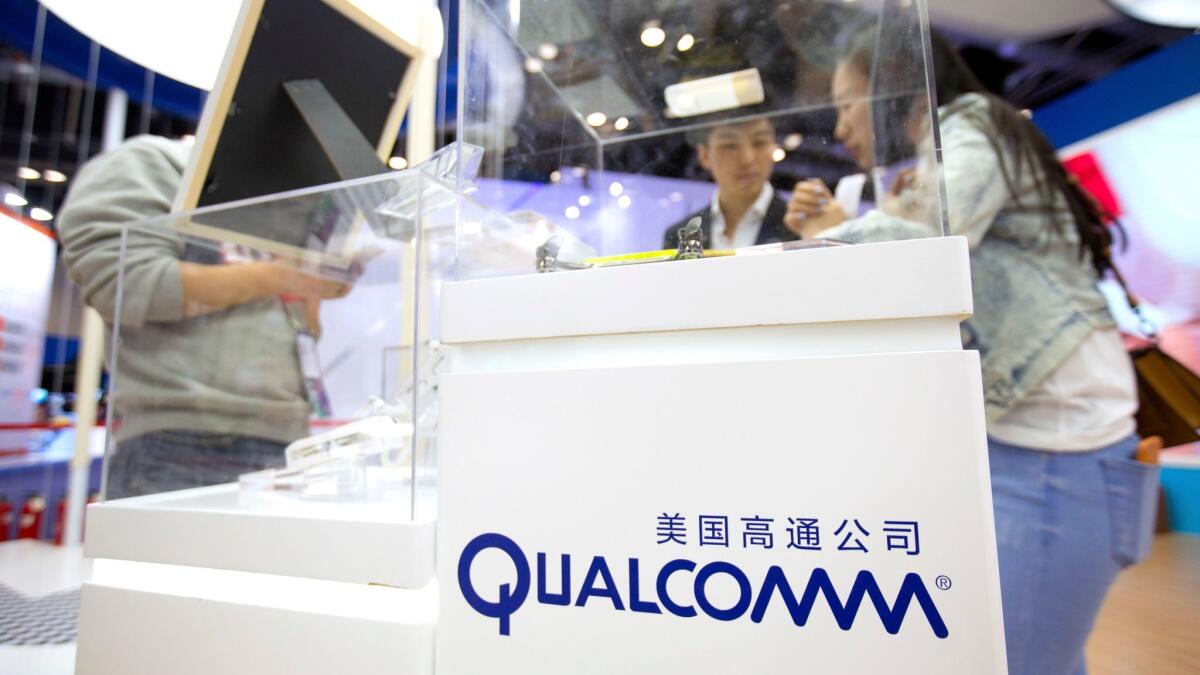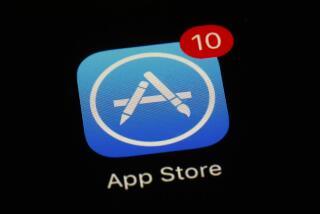European regulators hit Qualcomm with $1.2-billion fine over payments to Apple

- Share via
European anti-monopoly regulators fined Qualcomm Inc. $1.2 billion on Wednesday for making payments to Apple Inc. in exchange for exclusively using Qualcomm smartphone radio chips in iPhones from 2011 to 2016.
Qualcomm said it disagrees with the decision and will immediately appeal to the General Court of the European Union.
The San Diego wireless company is embroiled in a fierce legal battle with Apple and global antitrust regulators over its business practices surrounding patent licensing. It already has been fined by regulators in China, South Korea and Taiwan, and it is facing a lawsuit from the U.S. Federal Trade Commission.
The European Commission ruled that Qualcomm abused its market dominance in 4G LTE baseband chips, which link smartphones to cellular networks. Qualcomm’s 4G LTE chips were exclusively used in iPhone 4 through iPhone 6 models.
Before the iPhone 4 was launched in 2011, Qualcomm signed a transition agreement with Apple under which it would make payments to Apple on the condition that only Qualcomm chips would power cellular connections in iPhones and iPads, according to the commission.
In various lawsuits, Apple and regulators have called these payments rebates, while Qualcomm has referred to them as incentive payments.
“Qualcomm paid billions of U.S. dollars to a key customer, Apple, so that it would not buy from rivals,” European Union Commissioner Margrethe Vestager said in a statement. “These payments were not just reductions in price — they were made on the condition that Apple would exclusively use Qualcomm’s baseband chipsets in all its iPhones and iPads.”
In pending lawsuits, Qualcomm has argued that Apple was the one that demanded the incentive payments and included the exclusivity language in the agreements.
“We are confident this agreement did not violate EU competition rules or adversely affect market competition or European consumers,” said Don Rosenberg, Qualcomm’s general counsel. “We have a strong case for judicial review.”
The European Union said this agreement, which was renewed in 2013 and expired in 2016, effectively shut out competitors and discouraged their investment in research and development — in part because Apple is a very large buyer of cellular baseband radios.
The agreement covers a period of time when Qualcomm had a significant technology lead in 4G LTE, which replaced slower 3G networks.
The company invested heavily in 4G technology during the 2008-09 recession. It came out with a working chip well ahead of rivals such as MediaTek and Intel, which didn’t get competing 4G LTE products to market until 2014 and 2016, respectively.
Apple began buying Intel chips in 2016 for roughly half its iPhone 7 models. The commission said Apple’s internal documents showed it delayed making the switch until its agreement with Qualcomm was about to expire.
According to the EU, the agreement made clear that Qualcomm would cease payments if Apple commercially launched a device with chips supplied by a rival. In addition, if Apple switched suppliers, it would have had to return to Qualcomm a large part of the payments it had received in the past.
Qualcomm shares slipped 0.5% to close at $67.98 on Wednesday.
Meanwhile, Qualcomm is fending off a hostile takeover bid from Broadcom Ltd. and trying to close its $38-billion acquisition of NXP Semiconductors to diversify its business beyond smartphones.
mike.freeman@sduniontribune.com;







